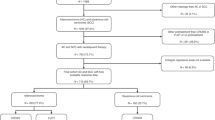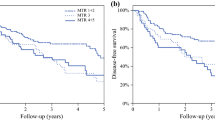Abstract
Purposes
Tumor regression grade (TRG) of the primary tumor after neoadjuvant therapy is one of the most sensitive prognostic factors among patients with locally advanced esophageal cancer, although no TRG system is fully accepted. The Ryan score was proposed in 2005 to evaluate TRG in rectal cancer and could be adaptable for pathological evaluation of esophageal cancer. The objective of this study is to evaluate the prognostic value of the Ryan score for esophageal cancer in the setting of trimodal therapy.
Methods
We performed a retrospective cohort study in which patients with locally advanced esophageal cancer, submitted to neoadjuvant therapy followed by surgical resection, were selected. One hundred thirty-four patients were selected. All tissue specimens were assessed as per the TRG system proposed by Ryan et al. Survival curves were assessed by the Kaplan–Meier method and log-rank test. Chi-square test or likelihood-ratio test was used for absolute and relative variables. Kruskal–Wallis and analysis of variance tests were used to assess significant differences on a continuous dependent variable by a categorical independent variable.
Results
Of the 134 included patients, 94 (70.1%) had squamous cell carcinoma, and 40 (29.9%) adenocarcinoma. Ryan score was correlated with histological type (p < 0.001), and clinical (p = 0.044) and pathological (p < 0.001) staging. Mean follow-up was 31.1 months. Multivariate analysis showed that Ryan score can safely predict survival, and systemic and lymphatic recurrence (p < 0.05).
Conclusions
Ryan score is an effective system to evaluate TRG and can predict risk for lymph node or distant metastasis, overall survival, and disease-free survival.



Similar content being viewed by others
References
Van Hagen P, Hulshof MC, van Lanschot JJ, Steyerberg EW, van Berge Henegouwen MI, et al. Preoperative chemoradiotherapy for esophageal or junctional cancer. N Engl J Med. 2012;366(22):2074–84.
Mota FC, Cecconello I, Takeda FR, Tustumi F, Sallum RAA, Bernardo WM. Neoadjuvant therapy or upfront surgery? A systematic review and meta-analysis of T2N0 esophageal cancer treatment options. Int J Surg. 2018;54(Pt A):176–81.
Lerttanatum N, Tharavej C, Chongpison Y, Sanpavat A. Comparison of tumor regression grading system in locally advanced esophageal squamous cell carcinoma after preoperative radio-chemotherapy to determine the most accurate system predicting prognosis. J Gastrointest Oncol. 2019;10(2):276–82.
Andreollo NA, Beraldo GC, Alves IPF, Tercioti-Junior V, Ferrer JAP, Coelho-Neto JS, et al. Pathologic complete response (ypT0 ypN0) after chemotherapy and radiotherapy neoadjuvant followed by esophagectomy in the squamous cell carcinoma of the esophagus. Arq Bras Cir Dig. 2018;31(4):e1405.
Mandard AM, Dalibard F, Mandard JC, Marnay J, Henry-Amar M, Petiot JF, et al. Pathologic assessment of tumor regression after preoperative chemoradiotherapy of esophageal carcinoma. Clinicopathologic correlations. Cancer. 1994;73(11):2680–6.
Chirieac LR, Swisher SG, Ajani JA, Komaki RR, Correa AM, Morris JS, et al. Posttherapy pathologic stage predicts survival in patients with esophageal carcinoma receiving preoperative chemoradiation. Cancer. 2005;103(7):1347–55.
Schneider PM, Baldus SE, Metzger R, Kocher M, Bongartz R, Bollschweiler E, et al. Histomorphologic tumor regression and lymph node metastases determine prognosis following neoadjuvant radiochemotherapy for esophageal cancer: implications for response classification. Ann Surg. 2005;242(5):684–92.
Ryan R, Gibbons D, Hyland JM, Treanor D, White A, et al. Pathological response following long-course neoadjuvant chemoradiotherapy for locally advanced rectal cancer. Histopathology. 2005;47(2):141–6.
Kim SH, Chang HJ, Kim DY, Park JW, Baek JY, Kim SY, et al. What is the ideal tumor regression grading system in rectal cancer patients after preoperative chemoradiotherapy? Cancer Res Treat. 2016;48(3):998–1009.
Rice TW, Patil DT, Blackstone EH. 8th Edition AJCC/UICC Staging of cancers of the esophagus and esophagogastric junction: application to clinical practice. Ann Cardiothorac Surg. 2017;6(2):119–30.
Takeda FR, Viyuela MS, da Cruz Junior JB, Tustumi F, Braghiroli OFM, Karolyne Ernesto Luiz Nobre KEL, et al. Variables associated to pathologic complete response, overall survival and disease-free survival in the neoadjuvant setting for esophageal cancer: a retrospective cohort analysis. Int Surg. 2018;103:214–21.
Dubben HH, Thames HD, Beck-Bornholdt HP. Tumor volume: a basic and specific response predictor in radiotherapy. Radiother Oncol. 1998;47(2):167–74.
Ji KSY, Thomas SM, Roman SA, Czito B, Anderson KL Jr, Frakes J, Adam MA, et al. Low- vs. high-dose neoadjuvant radiation in trimodality treatment of locally advanced esophageal cancer. J Gastrointest Surg. 2019;23(5):885–94. https://doi.org/10.1007/s11605-018-4007-3. Epub 2018 Oct 29.
Buckstein M, Rhome R, Ru M, Moshier E. Neoadjuvant chemoradiation radiation dose levels for surgically resectable esophageal cancer: predictors of use and outcomes. Dis Esophagus. 2018;31(5).
van der Werf LR, Dikken JL, van der Willik EM, van Berge Henegouwen MI, Nieuwenhuijzen GAP, Wijnhoven BPL; Dutch Upper Gastrointestinal Cancer Audit (DUCA) group. Time interval between neoadjuvant chemoradiotherapy and surgery for oesophageal or junctional cancer: a nationwide study. Eur J Cancer. 2018;91:76-85.
Shapiro J, van Hagen P, Lingsma HF, Wijnhoven BP, Biermann K, ten Kate FJ, Steyerberg EW, van der Gaast A, van Lanschot JJ; CROSS Study Group. Prolonged time to surgery after neoadjuvant chemoradiotherapy increases histopathological response without affecting survival in patients with esophageal or junctional cancer. Ann Surg. 2014;260(5):807–13; discussion 813–4.
Chiu CH, Chao YK, Chang HK, Tseng CK, Chan SC, Liu YH, Chen WH. Interval between neoadjuvant chemoradiotherapy and surgery for esophageal squamous cell carcinoma: does delayed surgery impact outcome? Ann Surg Oncol. 2013;20:4245–51.
Author information
Authors and Affiliations
Corresponding author
Ethics declarations
Disclosures
There are no relevant conflicts of interest or disclosures.
Additional information
Publisher's Note
Springer Nature remains neutral with regard to jurisdictional claims in published maps and institutional affiliations.
Rights and permissions
About this article
Cite this article
Takeda, F.R., Tustumi, F., de Almeida Obregon, C. et al. Prognostic Value of Tumor Regression Grade Based on Ryan Score in Squamous Cell Carcinoma and Adenocarcinoma of Esophagus. Ann Surg Oncol 27, 1241–1247 (2020). https://doi.org/10.1245/s10434-019-07967-8
Received:
Published:
Issue Date:
DOI: https://doi.org/10.1245/s10434-019-07967-8




